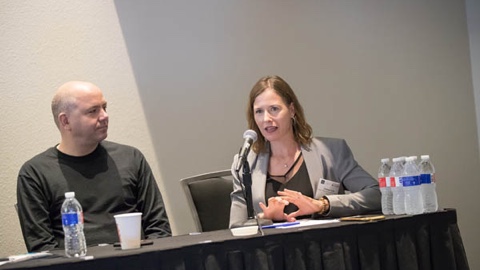
Cities thrive when the public and private sector can leverage each of their strengths and perspectives, learn from one another and build technology solutions that improve the urban experience. The overlap between industry and government is a necessary ingredient to create a truly smart city. This was a key takeaway from the City Solutions panel at Smart Cities Connect Conference & Expo, which paired corporate and city leaders.
Austin Ashe the GM of Intelligent Cities, Current powered by GE and Jim Haskins, Communities Solutions Specialist at Cisco each presented to a panel of city executives, including: Rosa Akhtarkhavari, Chief Information Officer, City of Orlando; Kip Harkness, Deputy City Manager, City of San Jose; Ted Lehr, IT Data Architect, City of Austin and Abhi Nemani, Former Interim CIO, City of Sacramento. Following the formal presentations there was a valuable Q&A on the top issues. Bob Knight, EVP & Chief Operating Officer, Harrison Edwards moderated.
The discussion focused on two of the foundational topics for smart cities: networks and data. Both Ashe (GE) and Haskins (Cisco) emphasized the importance of connected digital platforms to bring diverse smart city solutions together.
This convening aspect may be a solution to a challenge that Lehr (Austin) described as one of the concerns facing city leaders. Historically, city management has tended to follow department design instead of being user-centric. In other words, cities work in silos and federate valuable data, which can lead to a system-wide misalignment of priorities and processes.
Ashe and Haskins presented on how their digital platforms, based on deep industry expertise and experience can cut across bureaucratic barriers and also integrate with legacy systems. Akhtarkhavari (Orlando) has faced and is overcoming some of these same challenges as she has elevated the city with more than 68 million annual visitors and more than 260,000 residents to embrace data project and has concentrated her work on public safety. She discussed the importance of defining data opportunities for all departments, not just a single use.
These kinds of opportunities for vendors and city leaders to discuss issues and approaches is critical to advancing the progress for smart cities in the United States. Cities are learning how to think more creatively and embrace private sector principals while still remaining committed to their core purpose of serving the breadth of area residents and visitors.
Harkness (San Jose), emphasized the point of creating opportunities for public and private sector to interact. “We’re still in the wild wild West of smart cities.”


